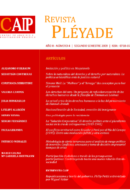
Published 2010-01-24
Keywords
- human right crisis,
- Hannah Arendt,
- new foundation for human right
How to Cite

This work is licensed under a Creative Commons Attribution-NonCommercial 4.0 International License.
Abstract
This paper examines Hannah Arendt´s proposal about human rigth. Arendt’s critical analysis shows how problematic and complex the idea of human rights is and that the realization of these “universal” and “indispensable” human rights is far from actualized even in today’s world. In the first part of this essay examines the concepts "human" and "humanity". The author argues that in Arendt there are at least two different conceptions of such concepts. The first is the idea of humanity as a natural attribute of every human being (Hobbes´ conception). The second notion of "human" is a political conception of humanity (Aristotle´s conception). In the second part discusses Arendt's notion of "the right to have rights", as his conception of a new foundation for human rights. The author argues that this idea leads Arendt to reflect two different models of political community. However, Arendt is not inclined to a particular model because it understands the fragility and uncertainty of human affairs can only be explained by contingency models that change over the course of history.